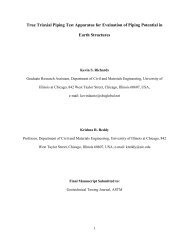Toward a Useful Theory of Mentoring: A Conceptual Analysis and ...
Toward a Useful Theory of Mentoring: A Conceptual Analysis and ...
Toward a Useful Theory of Mentoring: A Conceptual Analysis and ...
You also want an ePaper? Increase the reach of your titles
YUMPU automatically turns print PDFs into web optimized ePapers that Google loves.
Taylor, 2003; Wilson & Elman, 1990)? Are there term limits on mentoring? Is there a<br />
frequency requirement- how <strong>of</strong>ten does one or both need to transmit knowledge to sustain<br />
a mentoring relationship?<br />
Implications<br />
The purpose <strong>of</strong> this thought experiment was to highlight the difficulties in<br />
developing a useful <strong>and</strong> usable concept <strong>of</strong> mentoring. The analysis perhaps also shows,<br />
less directly, some <strong>of</strong> the reasons why research on mentoring is so scattered <strong>and</strong> why the<br />
development <strong>of</strong> a cumulative, empirically-based theory <strong>of</strong> mentoring still seems daunting<br />
even after decades <strong>of</strong> hard work.<br />
It is worth noting that we have not even begun to attend to the question “what is<br />
effective mentoring?” despite the fact that this is the single question that dominates the<br />
mentoring literature. It is difficult to gauge the effectiveness <strong>of</strong> a social technology absent<br />
some clarity about its meaning. In the next section we seek to lend some clarity to the<br />
concept <strong>of</strong> mentoring by providing a provisional definition <strong>and</strong> some boundary rules.<br />
THE MENTORING CONCEPT: A REFORMULATION<br />
As we suggested above, relatively few scholars actually provide a stipulative<br />
definition <strong>of</strong> mentoring. Most researchers cite Kram’s usage or neglect to provide a<br />
definition at all. As we provide ours, it will be apparent why conceptual <strong>and</strong> definitional<br />
issues are so <strong>of</strong>ten skirted- any definition that has a hope <strong>of</strong> distinguishing mentoring<br />
from other types <strong>of</strong> learning will necessarily be a complex one.<br />
In developing our definition we employ st<strong>and</strong>ard criteria (Balzer, 1986; Parsons,<br />
1971). First, the definition should reflect ordinary language usage <strong>of</strong> the term. The<br />
definition need not (<strong>and</strong> in this instance cannot) be identical to ordinary language use, but<br />
16



